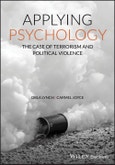This volume investigates the application of psychological theory to the case of terrorism and political violence.
This book offers a framework for approaching psychological research on terrorism that encourages an explicit orientation to the issues that have acted as road blocks to the potential for psychology as a discipline to meaningfully contribute to terrorism research. The framework encourages researchers to define the research parameters in clear concise terms, devoid of theoretical jargon and rooted in an understanding of real world social problems. Furthermore, researchers are encouraged to be explicit about the vantage point through which the problem is being viewed (i.e., is it a problem for participants themselves? For broader society, for policy-makers and other stakeholders?) and what the intended outcome of the research might be.
Furthermore, this volume aims to demonstrate how to apply existing psychological theory to terrorist related phenomenon. In doing so, researchers are asked to consider whether the research problem is psychological in nature and if so, what existing theories can help explain, if not alleviate the problem. As such, researchers in psychology are encouraged to dig deep, to tap into the wealth of knowledge available in psychology to understand terrorist related phenomenon as embedded within normal psychological processes, albeit manifesting in what can be considered exceptional situations and circumstances.
Applying Psychology: The Case of Terrorism and Political Violence will appeal to academics, students, and professionals interested in applied psychology, terrorism studies, sociology, international security, and international relations.
Table of Contents
List of Figures ix
About the Authors xi
Acknowledgments xiii
1 Introduction 1
1.1 Psychology and Terrorism Research - The State of the Art 1
1.2 Moving Forward 3
1.3 Defining Terrorism 6
1.4 Defining Terrorism or “the Terrorist” in Psychological Terms 7
1.5 Conclusion 9
1.6 Chapter Descriptions 10
2 Applying a Research Framework 11
2.1 Applying Psychology 11
2.2 The Process of Defining the Problem 13
2.3 Applying Psychology to the Problem 15
2.4 Having Defined the Problem, Can We Solve It? 16
2.5 Outcome/ Results/Application 17
2.6 Worked Example: Paramilitaries in the Northern Ireland Post-peace Process 19
2.7 Conclusion 21
3 Psychological Processes in Terrorism Research 23
3.1 Psychological Processes in Terrorism Research: Individual Versus Group Processes 23
3.2 Psychological Theories and Terrorism: Individual Versus Group Processes 24
3.3 Individual Processes: “Embodying” Terrorism 25
3.4 Biological Theories 26
3.5 Terrorism and Psychopathology 27
3.6 Psychological Trauma, Radicalization, and Terrorism 29
3.7 Root Causes 30
3.8 Social Cognition 32
3.9 Terrorism and “Universal Needs” 32
3.10 Terror Management Theory and Symbolic Immortality Needs 34
3.11 The Effect of Terrorism on “Everyday” People 35
3.12 It’s Not “Them,” It’s “Us” 36
3.13 Social Identity Theory 37
3.14 Disengagement as an Individual and/or Collective Phenomenon 38
3.15 Discussion 40
4 Methodological Considerations 43
4.1 Doing Terrorism Research: Pitfalls, Priorities, and Potential 43
4.2 Disclaimers 46
4.3 Methodological Concerns in Field Research 46
4.4 The Identity of the Researcher 47
4.5 Issues of Language Use 50
4.6 Ethical Responsibilities of Researchers in Divided Societies 53
4.7 Code of Ethics and Limits of Confidentiality 55
4.8 Methodological Approaches: Debates and Disputes 57
4.9 Retrospective Identity Construction 59
4.10 Method to Data Collection - How Can this Be Constructed within the Framework of Buunk and Van Vugt (2013)? 62
4.11 The Use of Visual Tools 63
4.12 Conclusion 64
5 From Paramilitary to Peacemaker: Ex‐Prisoners in Northern Ireland 67
5.1 Exploring the Use of Identity Management Strategies by Republican and Loyalist Ex‐Prisoners as They Retroactively Discuss Their Transition from Paramilitary to Peacemaker 67
5.2 The Psychology of Disengagement 69
5.3 Retrospective Identity Construction 70
5.4 Method 72
5.5 Interview Context and Procedure 72
5.6 Analytic Process 72
5.7 Preliminary Analysis 73
5.8 Identity Continuity and Context Variability 74
5.9 Transition and Identity Reinvention 77
5.10 The Negotiation of Legitimacy 80
5.11 Discussion 84
6 Making Meaning Out of the Conflict in Northern Ireland 89
6.1 Making Meaning Out of the Conflict in Northern Ireland: The Meaning Maintenance Model as a Framework for Understanding Engagement in Political Violence and Peace Building in Northern Ireland 89
6.2 Moving Forward 91
6.3 Meaning‐ Making in Postconflict Northern Ireland 92
6.4 Former Political Prisoners and Meaning‐Making 93
6.5 The MMM and Former Perpetrators in Northern Ireland 94
6.6 Method 96
6.6.1 The Negotiation of Terminology 96
6.6.2 Participants and Procedure 96
6.6.3 Analytic Process 96
6.7 Analysis 98
6.7.1 Interviewer‐Included Threats to Meaning 98
6.8 Using “Belongingness” to Challenge “Certainty” 103
6.9 Conclusion and Evaluation 106
7 Assumptions Around Identity: The Case of British Muslim Youths 111
7.1 Assumptions Around Identity: Radicalization and the Case of British Muslim Youths 111
7.2 Identity, Radicalization, and Psychological Research 114
7.3 Methodology 116
7.4 Results/ Discussion 116
7.4.1 Muslim Youths and Islamic Linked Terrorism in the UK 116
7.5 Intergenerational Change, Cultural Transmission, and Intergenerational Conflict 119
7.6 Discussion 123
7.7 Conclusion 125
8 Discussion 127
8.1 An Introduction 127
8.2 Applying Methodological Rigor in Psychology to Terrorism Research 128
8.3 Qualitative Research and Terrorism 131
8.4 Psychology and Terrorism: Bidirectional Relationships 132
8.5 Psychology and Terrorism: Opening up the Discussion and Future Directions 134
8.6 Conclusion 134
Bibliography 135
Index 153








